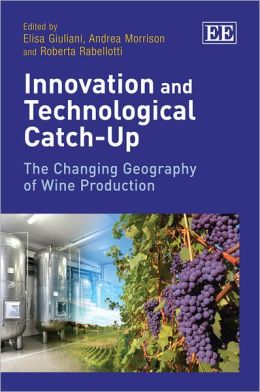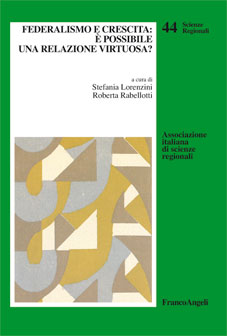Development Blog Centro Studi Luca d’Agliano
I contributed to the Development Blog with an article on catch up in the wine industry.
in Articles, Media Tags: Argentina, Catch up, Chile, Emerging Countries, Innovation, Italy, South Africa, Wine industry
I contributed to the Development Blog with an article on catch up in the wine industry.
in Articles, Media Tags: Argentina, Catch up, Chile, Emerging Countries, Innovation, Italy, South Africa, Wine industry
The Italian newspaper Sole 24 Ore published an article on my book on Innovation and Catching Up: The changing geography of wine production.
in Articles, Media Tags: China, FDI, Italy
With Carlo Pietrobelli and Marco Sanfilippo I wrote on Chinese investments in Italy and Europe.
in Articles, Media Tags: China, FDI, Italy
With Jose Luis Curbelo I wrote an article on the rapid expansion of Chinese multinationals in Europe.
in Journal Articles, Publications Tags: China, FDI, Italy
This study investigates the motivations driving Chinese outward direct investment to Italy. The analysis is based on secondary sources and in- depth interviews with key informants and senior managers of Chinese affiliates in Italy. The evolution of the Chinese pattern of entry in Italy confirms the pattern followed by Chinese firms in other European countries, adding some additional interesting results. Starting from small-scale operations in trade-related activities, Chinese FDI have evolved towards the acquisition of tangible and intangible resources that are deemed necessary to improve China’s presence in international markets and to upgrade their technological and production capacities.
Chinese investments in Italy are increasingly targeting the acquisition of technological capabilities and of design skills and brands to tap local competences available in specialized manufacturing clusters in sectors such as automotives and home appliances. The main industries of specialization of Chinese OFDI in Italy reflect this approach and appear to be related to China’s strategy to increase the sophistication of its exports and to move away from standardized commodities and intermediate manufactures and components.
in Books, Publications Tags: Argentina, Catch up, Chile, Emerging Countries, Innovation, Italy, South Africa, Wine industry

Since the beginning of the 1990s, the supremacy of ‘Old World’ countries (France and Italy) in the international wine market has been challenged by new players, such as Australia, Argentina, Chile and South Africa, which are recording stunning performances in terms both of export volume and value. This book demonstrates that such a spectacular example of catch-up goes beyond simply copying new technologies; it entails creative adaptation and innovation, and introduces a new growth trajectory in which consistent investments in research and science play a key role.
«This book overturns the old paradigm ideas about natural-resource-based activities. It sheds light on the new opportunities for technological dynamism and catching-up by using science to open novel directions in traditional sectors. It should become a classic in what I expect will be a very important academic debate and a new trend in development policy.»
Carlota Perez
Tallinn University of Technology, Estonia; Cambridge University and University of Sussex, UK
«This excellent book demonstrates better than any other I know the strengths and limits of the concept of a national system of innovation for understanding economic development today. Any careful student of innovation or development will want to read it.»
Charles Sabel
Columbia Law School, USA
Here you can read the introduction,
The Changing Geography of Wine Production_Intro
Here you can read some reviews of the book,
regional studies,
AAG Review of Books,
Journal of Wine economics,
agriregionieuropa_n28,
Il Sole 24 Ore
You can buy the book here.
in Journal Articles, Publications Tags: Clusters, Industrial districts, Italy
It investigates the evolution of specialization patterns for the Italian provinces over the period 1995-2005 by analysing the dynamics of the sectoral distribution in the Balassa index of revealed comparative advantages. The results show that underlying a relatively stable distribution of national comparative advantages over time, there are wide variations in local performance: only a few provinces demonstrate any stability in their specialization over the last decade, with the majority showing decreased specialization. We find a higher average degree of persistence for provinces with districts, but no systematic differences between provinces with or without industrial districts. District provinces show wide variation, with a few concentrating on their past comparative strengths, but many diversifying.
in Presentations Tags: China, FDI, Italy
A paper on Chinese FDI in Italy was presented in the Conference on Rising Powers and Global Standards: Identifying a new research and policy agenda.
Download the pdf, Pres Manchester 2011-01
in Journal Articles, Publications Tags: Catch up, Chile, Innovation, Italy, South Africa, Wine industry
From a development perspective an investigation of the changes that have occurred in the wine industry is of particular interest because it provides evidence on how emerging economies have been able to acquire significant shares of the international market in a dynamic sector. Based on novel empirical evidence, this paper shows that emerging countries with diverse institutional models and innovation strategies have actively participated in the process of technological modernization and product standardization. These newcomers in the wine sector have responded particularly effectively to changes in demand, aligning emerging scientific approaches with institutional building efforts and successful marketing strategies.
in Books, Publications Tags: Italy, Small and Medium Enterprises

Federalism is often described as a zero-sum game in which there is someone who gains and someone who loses, so the attention usually goes to issues about redistribution and equity. In this book, we assume a different perspective and investigate how federalism can facilitate growth and represent an opportunity for development. The papers collected here come from two different strands of the literature: the regional economic growth and its determinants and the analysis about federalism.
in Presentations Tags: Catch up, Chile, Innovation, Italy, South Africa, Wine industry

I was invited at a panel on the Economics of Inter- Firm Catch Up discussing how global economic recession, can be an opportunity for late-comers to enter the market and catch up with forerunners.
Download the pdf, Pres World Knowledge Forum 2009-10
in Journal Articles, Publications Tags: Clusters, Italy, Knowledge, Wine industry
The aim is to analyse the nature and extent of knowledge and information networks in an Italian wine cluster. Moreover, the relation between firms’ characteristics and the knowledge network structure is also explored. The empirical findings show that knowledge is unevenly distributed in clusters and that networks of knowledge and information differ a great deal in terms of their structure. In fact, knowledge flows are restricted to a tightly connected community of local producers, differing in terms of knowledge assets, innovation behaviour and overall economic performance with respect to the rest of the firms in the cluster.